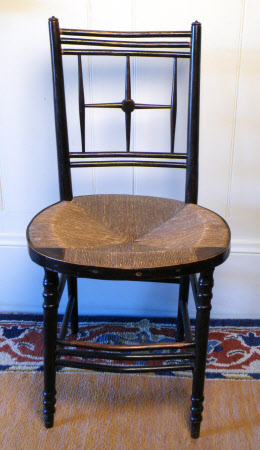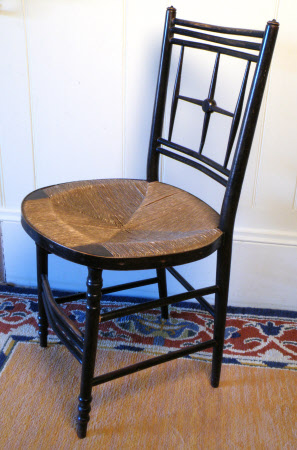Chair
Morris & Co.
Category
Furniture
Date
circa 1870
Materials
Ebonised beech, rush
Measurements
81.5 cm (Height); 43 cm (Diameter)
Order this imageCollection
Standen House and Garden, West Sussex
NT 1214043.2
Summary
One of a set of four ebonised and rounded rush-seat chairs, English, retailed by Morris & Co., circa 1870. Each with cross-shaped spindle splat flanked by vertical bars and between three upper horizontal bars and two lower bars, standing on ring-turned tapering legs joined by three curved bar front stretchers, each stamped with initials G.L. The range of rush-seated ebonised chairs introduced by Morris & Co. from circa 1865 and known as 'Sussex' chairs, were enormously popular and emulated by many other firms. The published price of this chair was 10s.6d in the Morris & Co. catalogue of circa 1910. The design for this chair was attributed to Ford Madox Brown in 'The Furnisher', 1900-01, p 61-63. (See Parry 'William Morris', V&A Exhibition catalogue, 1996, plate J25). A chair of this design can be seen in the drawing room of Windleshaw House, East Sussex, the home of W.A.S Benson and in the drawing room of The Grange, Fulham, the home of Edward Burne-Jones, both illustrated in J. Cooper 'Victorian and Edwardian Furniture and Interiors', 1987, Fig 405 and 438. This design also features in the settle NT 1214044.
Full description
Morris & Co. Founded in 1861 as Morris, Marshall, Faulkner & Co., the firm was soon referred to as Morris & Co., although the name was not officially adopted until 1875 when William Morris (1834-1896) became sole proprietor. Responsibility for the design of almost all commissioned furniture passed to Philip Webb, whose influence was enormous, and (from 1880) his assistant George Jack, while Morris produced designs for glass, tapestries and any painted furniture. From 1871 wallpapers, designed by Morris, became an important part of the business. Show rooms in Oxford Street were acquired in 1877. Greater commercial success in the 1880s led to the opening of a shop in Manchester in 1883. Some of the well-known interior schemes undertaken by Morris include Rounton Grange in Yorkshire, Old Swan House in Chelsea, Great Tangley Manor in Surrey, Wightwick Manor, Bullers Wood and Standen.
Marks and inscriptions
To underside of chair: G.L To underside of chair: G.L
Makers and roles
Morris & Co., manufacturer
References
Parry, Linda (ed) 'William Morris', V&A Exhibition catalogue 1996, plate J25 Cooper, Jeremy 'Victorian and Edwardian Furniture and Interiors (1987), Fig 405 and 438

